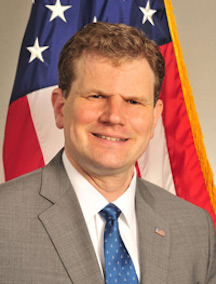President Joe Biden’s targeting of shipping lines in a crackdown on uncompetitive industries should be welcome news to American companies paying record-high rates for ocean freight, a market that a growing number of importers complain is dominated by just a few big players.
The executive order released by the White House on Friday takes aim at, among other businesses, a container shipping industry where 85% of capacity is controlled by about 10 major carriers. The order encourages the Federal Maritime Commission to ensure vigorous enforcement of rules so exporters aren’t hit with “exorbitant charges.”
The pandemic has given the the container carriers a huge advantage over their customers: Almost all vessels nowadays are sailing fully loaded, and there’s more demand than capacity to carry goods, particularly from the U.S.
“We have increased our scrutiny of the ocean carrier alliances to identify evidence of anti-competitive behavior regarding rates and capacity, and we will continue to do so as the Covid-19 and import surge crisis continues,” Federal Maritime Commission Chairman Daniel Maffei said in a statement Friday.

American exporters, meanwhile, are getting squeezed in the capacity crunch, with many containers returning to Asia empty so the carriers can keep goods flowing eastward form China. The FMC has already been investigating those issues.
But there are reasons to temper expectations about the impact U.S. regulators can have.
In an interview last month, Maffei, whom Biden tapped for the top FMC job back in March, was restrained when describing the commission’s powers to overhaul the competitive field. Doing so, he said, might actually make matters worse. Borrowing from Winston Churchill’s line about democracy, he said the “alliances are the worst system in the world, except for the alternatives.”
Here’s more of what Maffei said about competition in the shipping industry in the June interview:
Describe the scope of the FMC’s monitoring of the shipping alliances:
“We do very extensive monitoring. We ask for a bunch of information from the carriers that involve all sorts of things, from how many containers they’re transporting and their charges, what’s under contract and what isn’t and all sorts of things like that.”
“We’ve upped the amount of information, we’ve upped the number of times they have to report.”
What are you looking for?
“What we’re looking for is not how high the prices are but whether they would be substantially lower were we not in an environment where the alliances exist. Part of the challenge is one of the reasons why the alliances exist—it’s not to set prices, they’re not allowed to do that, they still have to compete on price—but is to allow space-sharing. The best analogy would be airliners: When you buy a ticket on United, suddenly you find yourself getting on a Virgin Atlantic flight.”
What challenges do you face in that effort?
“The problem with that is that actually makes it more efficient and probably, if anything, increasing the usable capacity. So that’s challenging to sort of say ‘if we didn’t have the alliances then we would have lower prices.’ The other problem, though, is even if we decide ‘oh maybe we can say that,’ we’re not just allowed to click a button and say you can’t do the alliance anymore. We would have to go to court and the burden of proof would be on the agency to prove that. And that’s a fairly challenging standard. So yes, right now I don’t believe we could go to court and prove that, but it doesn’t mean that you don’t keeping monitoring it and monitoring it carefully and perhaps even upping the monitoring if you get any wind of it.”
What are the alternatives to alliances?
“One thing I do warn audiences about—audiences of shippers, audiences of forwarders—is that the alliances may seem to be part of the problem but all the alternatives that would happen at least in the long run could very well make the situation worse. What I’m talking about is the alliances are not mergers—they do still have to compete on price, they are carefully monitored. If you don’t have alliances you’re likely going to see an increase in the rate of mergers that has already been very high over the past 20 years. When you think about it, we once had 22 to 24, depending on how you counted it, major carriers and now we’re down to, again depending on how you count them, let’s say nine. Without the alliances, you might have even more of that. Then what about the carriers left out of that—wouldn’t they be good competition? Well, they would if they survived. But even with alliances, we still saw Hanjin go under. So more bankruptcies are not at all beyond the possibility.”
What kind of influence can you have on the ocean-shipping industry?
“One of the advantages I think of being five independent commissioners at this commission is that we are able to reach out informally to the carriers, see what they’re doing, remind them in a friendly way of what the rules are and how extensively we’re monitoring, particularly on detention and demurrage, give them some sense of some of the stuff we’re hearing that they may not be hearing just because of the way corporate hierarchies work. And I think that that is helpful. It is certainly something I include as one of the things we are doing to try to address the crisis. But I won’t pretend that that moral suasion that we do will solve it on its own. But is something that we certainly try to do everything we can. Even on exports, we may only have very limited capacity legally to increase exports, but we can certainly do our best to persuade the carriers that in their long-term best interest, it is best if they take as many exports as they feel they can.”







